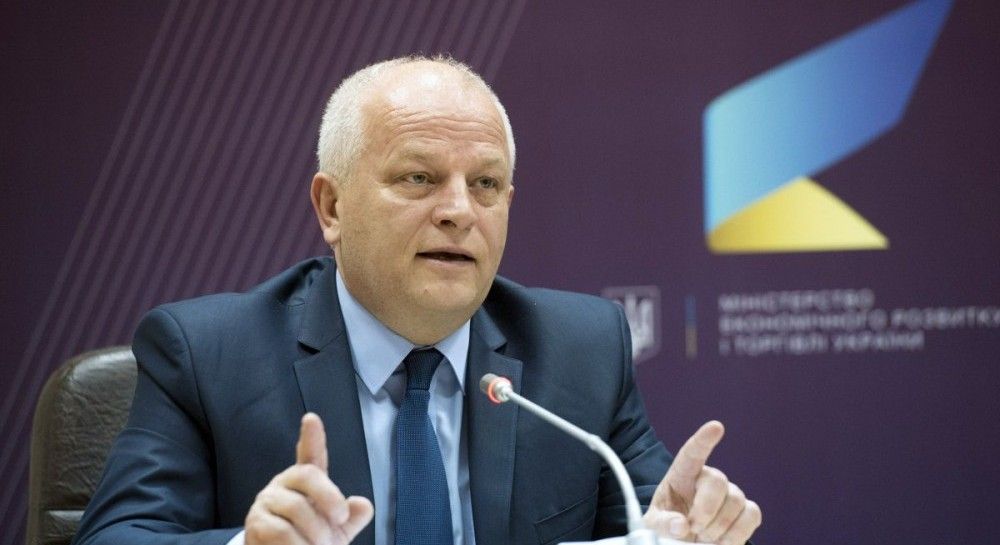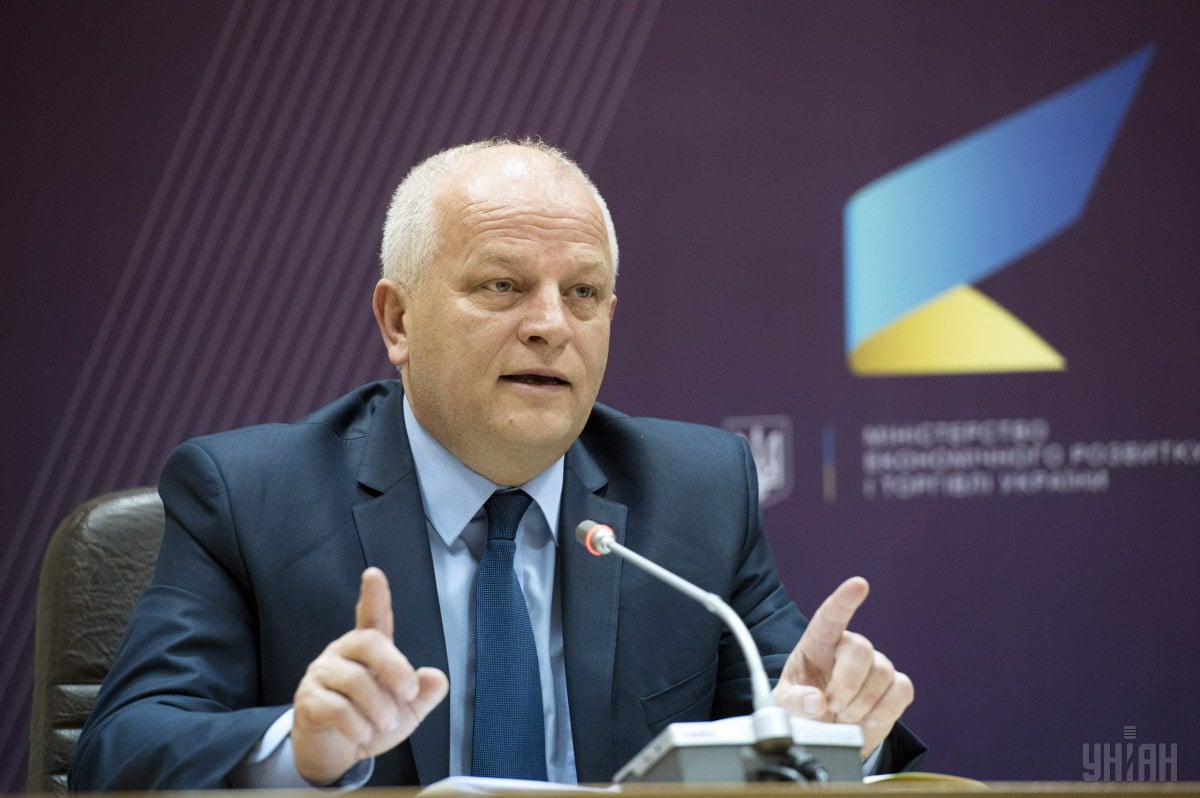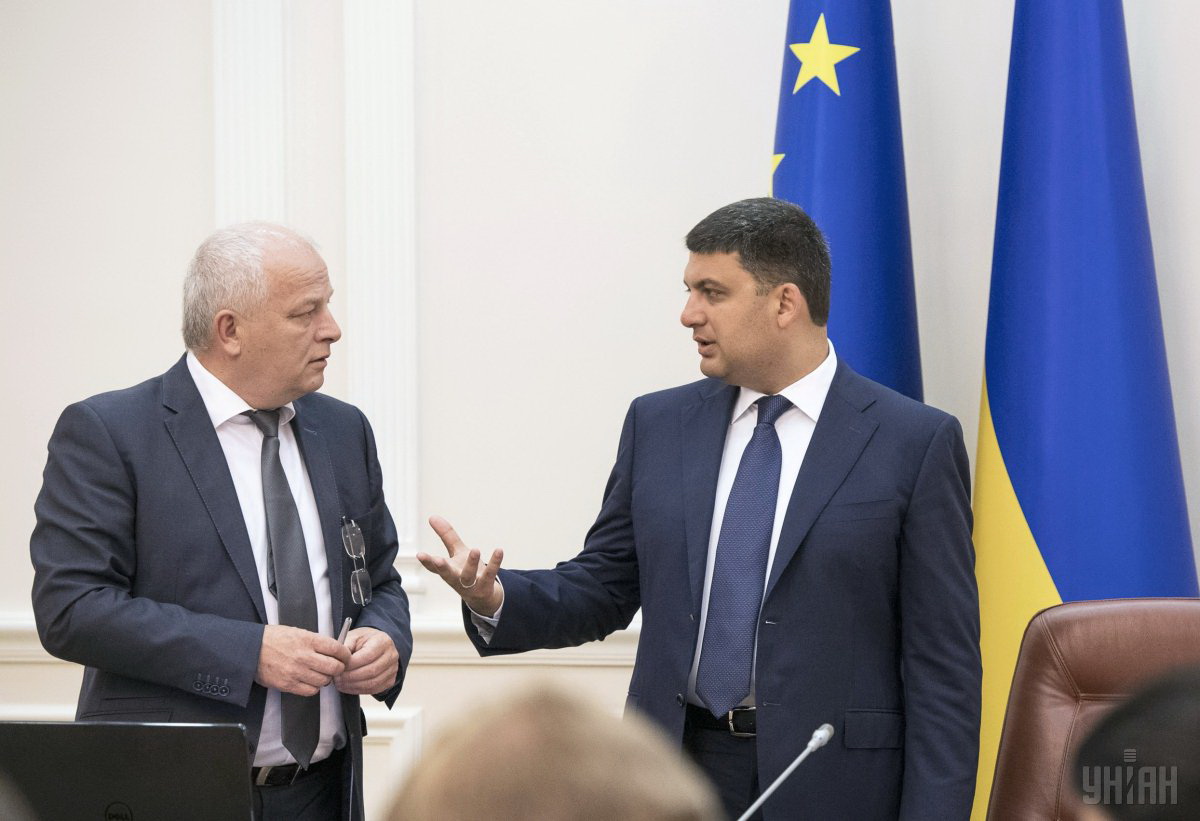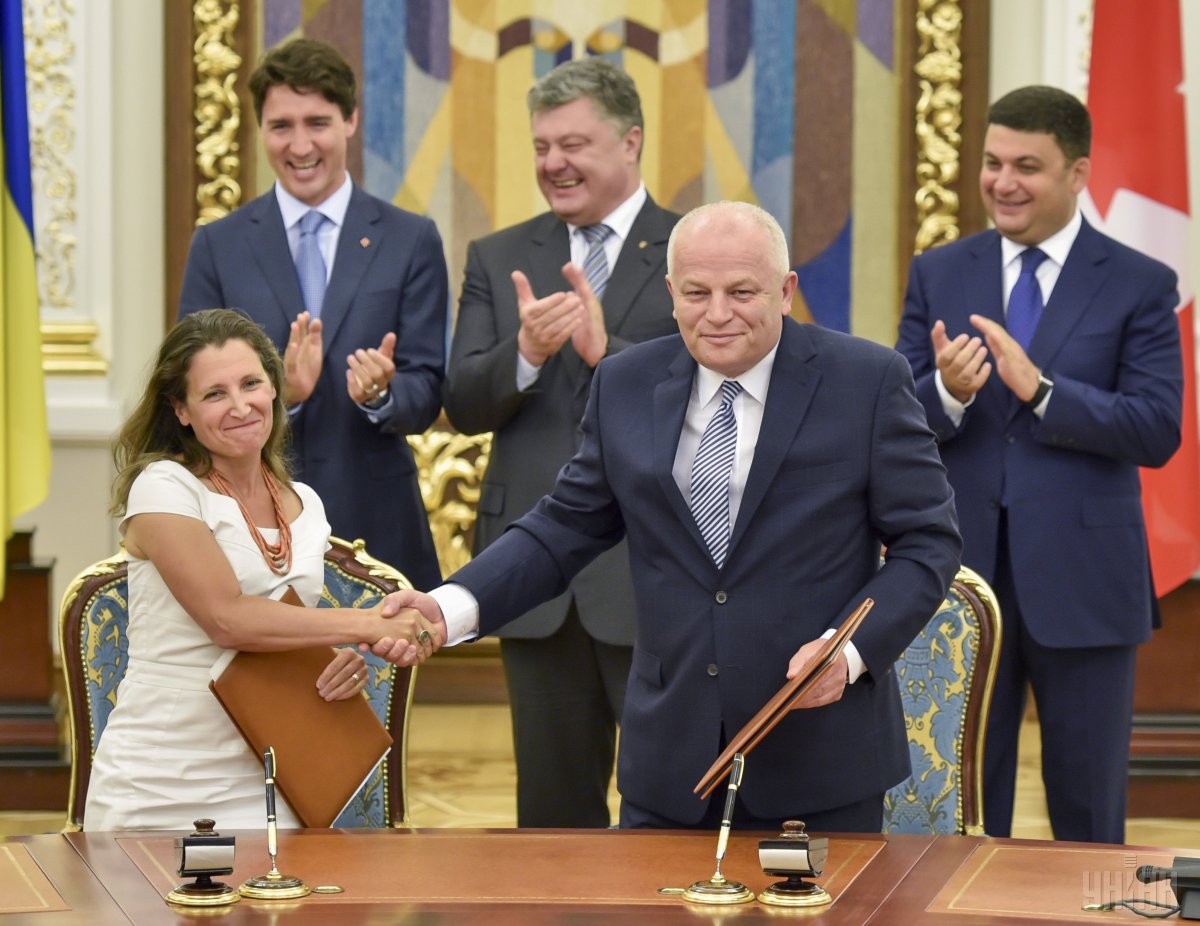
Stepan Kubiv: Ukrainian populists ganged up against important reforms and they zombify our society no less than Russian propaganda
The changes proposed by the Government should by the end of the year bring the country on the path of sustainable economic development. In an exclusive interview with UNIAN, First Vice Prime Minister of Ukraine Stepan Kubiv, has told, what exactly we are to expect.
The Cabinet led by Volodymyr Groysman recently celebrated its first 100 days in office. UNIAN asked the head of the government’s economic block, First Vice Prime Minister Stepan Kubiv to name the Cabinet’s main achievements over the said period and outline future plans. The official agreed to the proposal, however he chose to answer the questions in writing.

You started your work when the country was in a deep political crisis, losing the pace of reform. You had to take many difficult decisions. What did you face in the early days in office?
I remember well a briefing on the establishment of a single gas price – one of the first decisions of the new government. Everyone knew that it was the right thing to do, but only Groysman’s government actually dared to do it.
It was then when we found out that Ukraine has three enemies: the terrorists in the east, corruption and populists. The latter ganged up against important reforms and they zombify society no less than the Russian propaganda. At the same time, they rarely offer an adequate alternative to reforms.
Back in April, the officials had to revive the country and perform resuscitation, as doctors say. How has the situation in Ukraine changed over the four months, in your view?
I’ll name some important achievements. First, it’s the reform of the gas sector. There would be enough information for a separate interview, but I'll just remind you that on July 1, the Government approved a plan of restructuring of Naftogaz of Ukraine. It is extremely important for the reform in the gas sector in line with the requirements of the EU’s Third Energy Package.
Secondly, we are actively engaged in the reform of intellectual property. On June 1, the Government approved the Concept of reforming the state system of intellectual property protection. Besides the fight against piracy and tackling corruption in the registration of intellectual property, this reform will promote innovation development.
We continue the reform of corporate governance at the SOEs. In transparent contests, the leaders of the Ukrzaliznytsia [Ukrainian Railways] and Ukrposhta [State Postal Service] were elected. Let’s also remember about the Boryspil airport. When civic activists and independent members of the Nomination Committee [at the Ministry of Economic Development] expressed arguments against the selected candidate for the post of Boryspil airport CEO [Yuriy Solonchuk], we initiated a new competition. Many said that such thing would be impossible in the earlier days, but now it is the norm.
We continue to work to reduce administrative barriers for businesses. As a result, for the first time in several years, the industry index began to grow.
What are the priorities for the government at the moment?
First, the government has developed a clear operational plan, which defines priorities in its work and performance indices. That’s for everyone to understand what steps the government will be taking and what signals will indicate successful implementation of reform.
Following the plan, we will strengthen our achievements in stabilizing the economy and move toward sustainable economic growth. We make a serious bid on small and medium businesses. Hi-Tech Office Ukraine has begun its work, aimed to assist with the development of innovation in all sectors of the economy. Since May, the program has been working for 15 regional business support centers. We continue with deregulation, working to improve the business climate and expand foreign markets for our goods. Recently, a free trade agreement was signed with Canada, and we are now working on a free trade deal with Israel and on our National Export Strategy. However, we need that the parliament adopt as quickly as possible the laws important for easing business.
The Cabinet recently approved the macroeconomic indicators of Ukraine for 2017. Expectations are quite optimistic. How do you assess macroeconomic situation in the country today, after the first half of the year?
We see a gradual intensification of investment and growth in consumer demand. This positive effect is provided by macroeconomic stabilization, a gradual improvement of the business climate, the improvement of the management of the economy’s public sector, the harmonization of the national legislation with that of the EU.
Unfortunately, there are also negative factors. The growth and the positive effects are hampered by trade and transit restrictions on the part of Russia.
But in general, macroeconomic dynamics coincides with our estimates, which are laid in the forecast. Therefore, we expect further growth of GDP – by 1% in 2016 and y another 3% next year.
Could you comment on the state of relations with Ukraine’s key creditors, the IMF and the World Bank? Is it possible to achieve our goal regarding the implementation of all provisions of cooperation to get loan tranches?
The assessment by the IMF and World Bank means the evaluation of certain reforms in a certain country. A positive feedback is a positive signal to business, which decides on investing in Ukraine based ob such signals.
And despite the difficult economic and political conditions, Ukraine keeps receiving positive feedback on the course of reform, and therefore a result in a form of cash flow is just a matter of time.
At the same time, we must continue to strengthen the reform spirit. It is important that immediately after the parliamentary recess, the Rada engages in active work – there is a number of important bills that need to be adopted as soon as possible. I have repeatedly said that reform should be implemented with the joint efforts of government, parliament, and president.
From the second half of 2016, Ukraine starts large-scale privatization and implementation of joint projects, worked out during big investment forums, including in Canada. What are the hopes regarding privatization and investment projects? What results are you planning to present in the year-end is in the area of attracting investors and sales of state assets?
The first attempt to sell the Odesa Portside Chemical Plant has shown that investors in general are interested in Ukrainian assets, but they have reasonable concerns. The very first question concerns the initial price of the asset.
In the case with the OPP, the issue was the debt to the structures owned by Group DF. At that time, there had been no court ruling issued yet on the claims of Nortima. Recently, the District Administrative Court rejected Nortima’s claims, which is an important positive signal to potential investors, for whom the Nortima case was a major stumbling block. However, other issues regarding this plant still remain.
The Government will work to address if not all, then the major issues in order to complete privatization of OPP before the year-end.
That’s because, for this year, we have also scheduled privatization of six power generating companies and a number of other smaller assets, therefore the State Property Fund should do everything possible to ensure successful privatization.
Could you comment on the situation around the state-owned enterprises? Where should we expect staff contests in the near future, and where the changes in the form of management may happen, namely the supervisory boards established following the example of Naftogaz and Ukraliznytsya?
Since last year, the competitive selection procedure for the managers of SOEs has been enforced. Competitions are open to all candidates who meet the minimum selection criteria. Our attention is certainly focused on the 45 largest state companies with assets of more than UAH 2 billion or revenue over UAH 1.5 billion. The selection procedure is tougher there. The candidates for top posts in these companies go through the Nominating Committee where they are evaluated not only by ministers, but also by independent experts representing international financial institutions and Ukrainian business community.
We must understand that the SOEs compete for top managers with the private sector. So, in order to find managers for the SOEs, we engage professional recruiters. We are also ready to offer the best market wages to our candidates. They have extensive management experience in the private sector and we expect them to improve operational efficiency of enterprises and introduce modern management mechanisms.
Today, the new leaders are already working in 11 major SOEs, including Ukrzaliznytsya, Ukrposhta, Ukrgazdobycha and others. The competition is now open at Yuzhne Design Bureau. Vacant positions of CEOs remain at Mariupol Sea Trade Port, Ukrspirt, Ukrkhimtransamiak, Boryspil airport, and Electrotyazhmash. Soon, the competitions will be announced in these companies as well.
Naftogaz became first among the largest SOEs to form a Supervisory Board with a majority of independent members. Three independent members of the supervisory board of this company come from the private sector and each has some 20 years of experience in the oil and gas sector in different markets around the world. Our plans for the near future include creating similar professional independent supervisory boards at 15 major SOEs. We have developed rules of formation and functioning of the supervisory boards at SOEs. After agreeing on them, we will submit them to the Government approval.

Prime Minister Groysman constantly stresses the need to continue the process of deregulation of the economy. What decisions are expected in this area in the coming months? Will the process of regulatory guillotine continue, launched by the previous minister Abromavicius?
Our task is to simplify the business environment. We continue the processes started earlier and initiate the new ones. The other day, I signed an order to five ministries on the beginning of systemic review of regulatory documents in the agriculture, construction, transport, infrastructure, energy, IT, international trade and food safety.
Easy Business, BRDO and State Regulatory Office should analyze regulatory documents in each sphere and find out whether certain regulations are indeed necessary. They also have to clearly state the expected benefits of each kind of regulation.
This will make regulations effective, get rid of excessive regulatory burden, along with corruption and a large number of barriers to doing business.
But I should note that we can’t simply cut or cancel everything: regulation must guarantee safety where needed. And there’s no need to invent the wheel, first we must adopt and implement what we have already developed.
Before the holiday period, 39 bills stuck in Parliament, prepared in the framework of deregulation plan and Doing Business Roadmap. You need to focus on this, and on the new deregulation plan. We must also get rid of the Soviet atavisms and eliminate corruption-eroded price regulation in Ukraine.
Let’s analyze our foreign trade relations. Spring and summer were rather alarming - there emerged difficulties with Moldova, sanctions were intensified by Russia. What is the current situation with Moldova?
Moldova is an important market for a number of goods from Ukraine. After the introduction by the Republic of Moldova of quotas for duty-free import of goods of the Ukrainian origin, we immediately met with Minister of Economy Octavian Kalmyk. We discussed possible solutions to issues regarding Ukrainian exports to Moldova on certain types of products. Ukrainian side has already prepared and sent to the Moldovan side statistical data as well as proposals for the removal of restrictions. We are currently waiting for a response from the Moldovan side. We are in constant dialogue and we are set to address the situation in the best way possible.
As for Russia, should we expect further deterioration of trade restrictions? Could you comment on the situation in this area? What consequences are domestic producers already experiencing and what should they expect in the future?
Restrictions imposed by Russia are unfounded, so any forecast or prediction of Russia’s actions today is meaningless. Actions of Russia often contradict common logic and often violate the law.
As for the restrictions, I wouldn’t name them all again - we have been informing the public very extensively about the list of restrictions in the early days through the channels of the Ministry of Economic Development and the Ministry of Infrastructure, and through the hotline. We held daily meetings of Operational Headquarters.
Of course, these restrictions not only negatively affect the Ukrainian manufacturers, they also significantly worsen positions of Ukraine as a transit country for European goods. This is no coincidence, but rather part of a planned economic aggression against Ukraine.
Of course, Kyiv must introduce adequate response measures. But unlike Russia, Ukraine will strictly adhere to laws and procedures. Currently, the Government resolution extended the embargo on Russian products until the end of 2017.
July 27, at the meeting of the WTO General Council in Geneva, Ukraine once again urged the Russian Federation to immediately abolish unjustified restrictions on transit and restore a non-discriminatory and free transit regime for all WTO members.
The position expressed by Ukraine was supported by the delegations of a number of WTO members, particularly, the EU, the United States, Canada, Japan, Australia, Norway, Georgia, South Korea, who noted the need for the immediate removal by the Russian Federation of trade restrictions and ensuring compliance with WTO rules.
By the way, how strong is our position in the WTO?
Ukraine has an active position in the WTO, we have been actively using WTO as a negotiating platform, analyzing trade regimes and implementation of the obligation of WTO members, monitoring legislation and bringing up issues at WTO meetings. Since 2013, we have been raising the issue of unjustified bans on deliveries of Ukrainian goods to the Russian Federation. Work was done within the relevant committees regarding technical barriers to trade and sanitary and phytosanitary measures. This issue is examined by the WTO General Council, which is one of the highest decision-making bodies.
It should be understood that this is a process that requires compliance with a set of rules and procedures. It is important that Ukraine, unlike Russia, act in accordance with international law. This ultimately will have a positive effect.
In July, Ukraine and Canada signed a free trade agreement. Experts argue that the importance of the document is allegedly exaggerated, because the most interesting areas for Ukraine were left "beyond the deal". The point is that the Ukrainian agricultural production does not receive wide access to the Canadian market. Is it true?
Let me explain how this works. Canada uses the global system of tariff rate quotas for all countries. Thanks to the free trade agreement, Ukrainian agricultural products, under the quotas, immediately upon entry into force of the agreement, will receive better access (with a zero duty) than other countries that have no preferences.
In addition, according to an analysis conducted by the WTO, the volume of global quotas on certain products (whey, wheat, barley, beef and veal, ice cream, margarine, dry buttermilk) is not used to the fullest. Therefore, Ukrainian producers can use the opportunities provided by this agreement.

How are the negotiations on the FTA with Israel going?
The negotiations on signing a free trade agreement with Israel are included in the Government Program for 2016. Recently, Natalia Mykolska [Ukraine’s Trade Rep.] returned from Jerusalem, where the third round of free trade negotiations was held. The prospects are very good. Currently we have discussed and worked out the basic provisions, in fact, the draft agreement. At the talks, we have discussed the possibility of reciprocal liberalization of trade in agricultural and industrial goods. We have a signed report on the outcome of negotiations, where we recorded key agreements between Ukraine and Israel. The nearest task is to hold consultations with business associations and to clearly define their areas of interest and cooperation.
How do you assess the potential of Ukraine’s presence in EU markets? How effectively is it being used?
It is being used actively. In terms of figures: almost 30,000 of EUR.1 certificates have been issued as of the end of July, including verification of EUR.1 certificates, issued last year by the Chamber of Industry and Trade. 86 companies received the status of authorized exporter, which provides the ability to export to the EU without having to obtain a certificate.
Ukrainian manufacturers have been actively using trade preferences with EU, the export proceeds also beyond the tariff quotas. As of the end of July, nine tariff quotas for agricultural products have been used in full. Traditionally, it’s poultry meat quota that has been fully used; the tariff quota for butter and dairy spreads is used by 46%, for powdered milk it’s 30%. In general, I must say that exports to the EU this year increased by 7%, especially food products (68%).
How else can Ukraine strengthen cooperation with the EU and improve opportunities for entering new markets?
An extremely important event is the recent visit to Ukraine of European Commissioner Oettinger. Together with Volodymyr Groysman, he presented in Kyiv a digital community project that will create a single digital space between the EU and Ukraine. The digital community will contribute to further unification with the EU, create preconditions for accelerating the development of Ukraine's economy, expand opportunities for SMEs, facilitate bureaucratic procedures between countries.
What do you think of the markets of other countries? What is necessary to immediately pay attention to, in your opinion?
We should gradually and systemically expand markets in all directions. Currently, we are actively working on expanding to the markets in the Middle East, Africa, Latin America and certain countries of Asia-Pacific region. They are the most promising for the sale of Ukrainian agricultural products, machinery and metallurgy.
At a meeting August 8, the Government approved a document that will launch the accession of Ukraine to the Regional Convention on pan-Euro-Mediterranean preferential rules of origin. This opens prospects for Ukraine to have more favorable conditions for exports of goods and expand the presence of Ukrainian products to the markets of EU member states, EFTA, Montenegro, Serbia, Morocco, Algeria, Tunisia, Egypt, Israel, Jordan, Turkey, the Faeroe Islands, Albania, Macedonia and Moldova.
Besides, after the visit to Indonesia in the delegation headed by President Poroshenko, we also agreed to start bilateral consultations with the Indonesian side for cooperation in trade and economic sphere.
Olesia Safronova (UNIAN)

